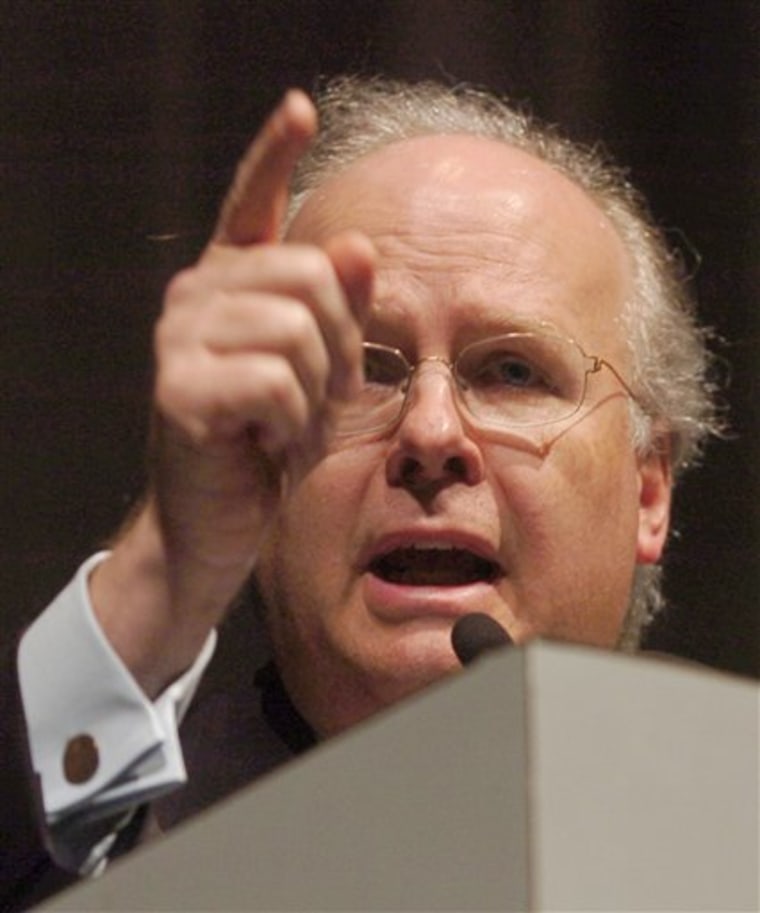White House political adviser Karl Rove raised questions in early 2005 about replacing some federal prosecutors but allowing others to stay, an e-mail exchange released Thursday shows.
"Karl Rove stopped by to ask you (roughly quoting) 'how we planned to proceed regarding US Attorneys, whether we were going to allow all to stay, request resignations from all and accept only some of them, or selectively replace them, etc.,'" Colin Newman, a staffer in the office of counsel to the president, wrote to a colleague.
The one-page document, which spans e-mails between the White House and the Justice Department in January 2005, also indicates Attorney General Alberto Gonzales was considering a range of options in dismissing U.S. attorneys early in President Bush’s second term.
But it concludes with Gonzales’ top aide warning that an across-the-board housecleaning “would certainly send ripples through the U.S. attorney community if we told folks they got one term only.”
The e-mails released Thursday by the Justice Department indicated that Gonzales and his then-chief aide, Kyle Sampson, suggested replacing 15 percent to 20 percent of federal prosecutors they identified as underperformers.
Sampson resigned under fire this week over the Justice Department’s mishandling of the firings of eight U.S. attorneys — and misleading Congress about the process.
Rove sees hypocrisy
Earlier Thursday, Rove said the removal of prosecutors was based entirely on policy and personnel matters at the Justice Department.
In an appearance Thursday morning at Troy University in Troy, Ala., Rove said the dismissals were no different than ones in the Clinton administration, and he questioned why the Bush administration's action is drawing "super-heated rhetoric" while the dismissals during President Clinton's terms did not.
"In each of these instances a decision was made at the Department of Justice on the basis of policy and personnel," Rove told students at a journalism seminar.
"We're at a point where people want to play politics with it. That's fine," he said. "I'd simply ask everybody who's playing politics with this be asked to comment about the removal of 123 U.S. attorneys during the previous administration and see if they had the same super-heated political rhetoric."
The 123 included 93 Republican appointees that the Democrat Clinton replaced when he began his first term, which is common in such a change of command. Rove did not give any details on who the other 30 were.
By comparison, he said, "We've replaced a total of 128."
Rove, who took questions only from students during his one-hour appearance, did not address what role he may have played — a question some Democrats in Congress want to ask him.
The dismissal of seven federal prosecutors has drawn fire in Congress over the role White House officials played and possible attempts to politicize federal investigations.
Two dismissals explained
Defending the dismissals, he said the U.S. attorney in Southern California was removed because "she would not commit resources to prosecute immigration offenses" despite a request to do so from the Justice Department.
"The U.S. attorney in Arizona said he would not ask for the death penalty. The administration has a policy of, where appropriate, asking for the death penalty," Rove said in response to a student's question.
Former U.S. Attorney Redding Pitt of Montgomery, a Democrat who served as a federal prosecutor during the Clinton administration, said in a phone interview that he recalled only six or nine U.S. attorneys being "moved out" because of issues of conduct.
"It was always at the recommendation of upper-echelon, permanent Department of Justice personnel," he said. "I don't ever recall the White House being involved."
At Troy, Rove spoke to about 800 students. But his audience also included friends from his days as a political consultant in the 1990s, when he worked on state Supreme Court races in Alabama and helped turn the state's highest court from all Democrat to an 8-1 Republican majority.
Rove worked in Alabama campaigns after successful GOP efforts in Texas, where he first teamed up with George Bush.
"When I moved to Texas in 1977, they hunted Republicans with dogs," Rove said.
'Masses are not asses'
Asked by one student about trying to manipulate the media in a campaign, Rove said the public can't be manipulated by candidates who try to mislead.
"The masses are not asses. They will figure it out," he said.
Rove told the journalism seminar that "the media spends too much time doing polls" rather than concentrating on what's actually happening. He also said the explosion of news media through talk radio, cable news channels and the Internet has led to changes in how events are covered.
"People have to have controversy and people have to have a fracas in order to generate attention to the media," Rove said.
